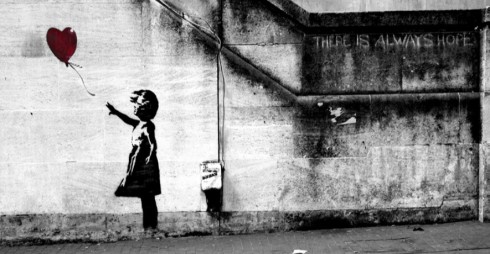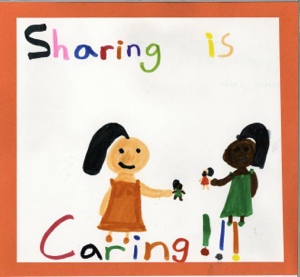A sermon for the 4th Sunday in Easter.
It is part of a preacher’s job to bring good news, and have I got some good news for you: today is Sunday. That means that last week is over and we have a new week with new possibilities ahead of us. Wahoo!
Weeks like this past week are the weeks, the days, the times when it is most difficult to come up with good news and, simultaneously, the weeks when sharing, hearing, partaking in the good news is vital. When everything seems to be spinning out of control, that is when we need the good news of Jesus Christ more than ever.
I really wish I could just come up here, say, “Jesus loves you!” and sit back down. I’m angry and I’m sad and I’m frustrated with the state of the world. I’m tired of watching innocent people die, angry about the role money plays in politics, tired of people who prefer their own version of liberty to the safety of others. I’m incredibly sad that every time a terrorist attack occurs on our soil, someone decides to just start beating up anyone who looks like what they think the terrorists may have looked like (usually someone with brown skin). I’m very much over companies that complain about regulations, don’t abide by them, and then have horrific accidents that kill people. I’m outraged at the way our elected leaders have violated human rights accords and human decency. I’m kind of tired of it all. I want to take my ball and go home.
Then I am reminded of the reasons to hope, the reasons to stay and keep playing.
I have read a ton of great mini-sermons this past week that are springboards for hope and optimism. One of my favorite memes going around right now is the quote from Fred Rodgers that says, “”When I was a boy and I would see scary things in the news, my mother would say to me, “Look for the helpers. You will always find people who are helping.” To this day, especially in times of “disaster,” I remember my mother’s words and I am always comforted by realizing that there are still so many helpers – so many caring people in this world.”
Look for the helpers. They are everywhere. Not only in times of tragedy, but in every day life. We are surrounded by people who teach, who heal, who serve and love boundlessly. But these aren’t the news stories. The news stories celebrate the ugly, the inhumane – the news stories celebrate our sin and keep us in a state of fear. Fear of our neighbor, fear of the other, fear of this world.
As the 24 hour news cycle rolled on and on this week, they managed to highlight the helpers, but still kept a lazer focus on the gore, the blood, the death that happened on our own soil, with nary a mention of the daily reality of terror that exists around the world or the terror that our nation has inflicted on other nations and individuals.
Sorry, I’m going down the spiral of negativity again. My bad.
Here’s another mini sermon I read this week, a quote from comedian Patton Oswalt:
I remember, when 9/11 went down, my reaction was, “Well, I’ve had it with humanity.”
But I was wrong. I don’t know what’s going to be revealed to be behind all of this mayhem. One human insect or a poisonous mass of broken sociopaths.
But here’s what I DO know. If it’s one person or a HUNDRED people, that number is not even a fraction of a fraction of a fraction of a percent of the population on this planet. You watch the videos of the carnage and there are people running TOWARDS the destruction to help out. This is a giant planet and we’re lucky to live on it but there are prices and penalties incurred for the daily miracle of existence. One of them is, every once in awhile, the wiring of a tiny sliver of the species gets snarled and they’re pointed towards darkness.
But the vast majority stands against that darkness and, like white blood cells attacking a virus, they dilute and weaken and eventually wash away the evil doers and, more importantly, the damage they wreak. This is beyond religion or creed or nation. We would not be here if humanity were inherently evil. We’d have eaten ourselves alive long ago.
So when you spot violence, or bigotry, or intolerance or fear or just garden-variety misogyny, hatred or ignorance, just look it in the eye and think, “The good outnumber you, and we always will.”
There is a lot of gospel truth in those words. The prices and penalties incurred Oswalt is talking about is what we, as Christians, call sin. We are all broken, but every once in a while someone (or some ones) get more broken than the rest of us or they act out on their brokenness in ways most of us would never dream of.
In our brokenness, in spite of our sinful nature, most of us still try to do right. Most of us still try to follow Jesus, most people still try to do the right thing. We hear his voice beckoning us, trying to call us out of the darkness and into the light, calling us away from our self-serving ways and towards God-serving ways.
The helpers, the people who run into the violence, the people who open their homes to strangers and immediately donate blood: these are the people who follow the voice of the Good Shepherd. These are the people who give us hope that not all is lost, that there is still love and decency in the world.
I have seen these helpers and felt sparks of hope for the world in the world. Where do I, in my cynical, irritable state, look to find hope right now in the word of God?
Revelation? Yeah, that’s totally weird for me. Revelation has never been where I have gone to for hope. Weird stories? Yes. Tales of bloodshed and war? Yes. Hope? Not usually.
But it’s right there. John has been writing for quite a few chapters about all kinds of horror. Then he takes a break and reminds us that horror, even of the kind of horror he describes in his Revelation, has an end. Pain has an end. Hunger has an end. And we have a God who wants to end all of these things for us and to wipe every tear from our eyes.
We could argue all day about what Revelation is. Is it an accurate prediction of what will happen when Jesus comes again? Is it a hallucination brought on by seizures or eating the wrong berries on the island? Is it a political tome to provide courage and hope to the Christians in the diaspora? Does it matter? However literally it is meant to be taken, Revelation is still a book of hope, of renewal, of encouragement for us when we go through our own tribulations. It is a story for when we see our worlds falling apart around us we can take a moment to remember that it hasn’t always been this way and it won’t always be this way. We can take a moment to remember that God wants to wipe every tear from our eyes.
The cynic in me asks, “If God wants us to not have any pain, then WHY IS THERE PAIN?” The cynic in me asks that a lot.
But the answer is sin. Our world is a broken place. Not everybody hears the Good Shepherd, and not everyone who hears follows. God doesn’t force us to listen. We get to make our own choices. And, sometimes, we make some really, really bad choices.
The root of our bad choices is, usually, fear. We fear for our lives, our livelihood, our safety, our belongings. In order to stay safe, to protect what is ours, we put ourselves first.
This is how common sense gun regulation supported by an overwhelming majority of the American people gets voted down. Representatives afraid of losing money, of being primaried, afraid for their careers (more so than for the lives of their representatives). This is how our leaders justify torture of prisoners – they are afraid of more injuries, more attacks and will use any means necessary to get the information. Information that usually ends up being useless. This is how terrorists rationalize what they are doing – they are protecting a way of life they fear losing. Fear is what drives racism, homophobia, misogyny – the list goes on and on.
When we trust in God, we are able to lose that fear. When we follow Jesus, we are able to let go of our fears for our own lives and worry more about the lives of others and the life of Christ.
Our world will never be free from sin. It will never be not broken. But it can be less broken. There can be less violence, less hate, less anger, if we truly hear Jesus’ voice and follow. We are called to be the helpers, we are called to be beacons of hope when the world gets dark. Our knowledge of salvation in Christ in both this life and the next allows us to hold on to hope when the rest of the world can’t, to be hope for others when their worlds are falling apart. We are called to be hope, to embody it. This is the call of the good shepherd. We are able to do this, to follow Jesus, to be hope as a gift of God in Jesus Christ.
I am still angry, I am still sad, I am still hurting for the world. But I can hear the voice of the good shepherd calling me, calling us to follow and I know that, in that call, lies hope.


